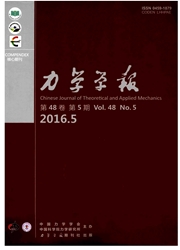

 中文摘要:
中文摘要:
应用拉索索端阻尼器是大跨度斜拉桥拉索减振的主要措施之一.将主梁、索与阻尼器组合起来作为一个振动体系,通过理论分析与试验研究相结合的方法初步研究了主梁振动对拉索附加阻尼器减振效果的影响.建立了由索、梁和Kelvin阻尼器组成的简化理论模型;设计了索、梁和阻尼器组合系统的简化力学试验模型;详细研究了主梁振动对拉索附加阻尼器减振效果的影响.理论与试验分析结果表明:对于容易发生索、梁耦合振动的拉索,主梁振动明显降低拉索附加阻尼器的减振效果;在大跨度斜拉桥拉索的减振设计中,需考虑主梁参与振动的影响.
 英文摘要:
英文摘要:
With the span of cable-stayed bridge increasing, the stay cable becomes longer to obtain the close fundamental frequencies of bridge and cable, and to increase the probability of coupled vibration between cable and girder. Generally, the dynamic characteristics of long cable are determined by the interactions among pylon, cable and girder. One of the most effective vibration mitigation measures is to use mechanical damper for long stay cables of large span cable-stayed bridges. In the conventional design theory for cable damper, it is assumed that the cable's ends are fixed and one end of the damper is connected with cable and the other end is fixed to girder. However, when the span of cable-stayed bridge becomes large and the structure becomes more flexible, the effect of girder vibration on the cable damper performance should be considered. Furthermore, the damping ratio in theoretical analysis is always smaller than in the full-scale cable vibration mitigation tests on actual cable-stayed bridges. Therefore, the relation between girder vibration and the efficiency of cable damper is investigated in this paper. A simplified theoretical model with cable, Kelvin damper and girder is analyzed by complex mode method. Model tests are also carried out to study the influence of girder vibration on the modal damping ratio of cable. Both theoretical andexperimental results show that the girder vibration should be taken into account in cable damper design for long span cable, especially for the coupling vibration with cable and girder.
 同期刊论文项目
同期刊论文项目
 同项目期刊论文
同项目期刊论文
 期刊信息
期刊信息
